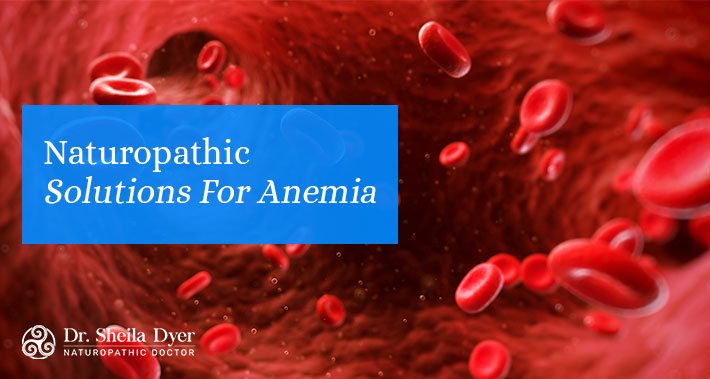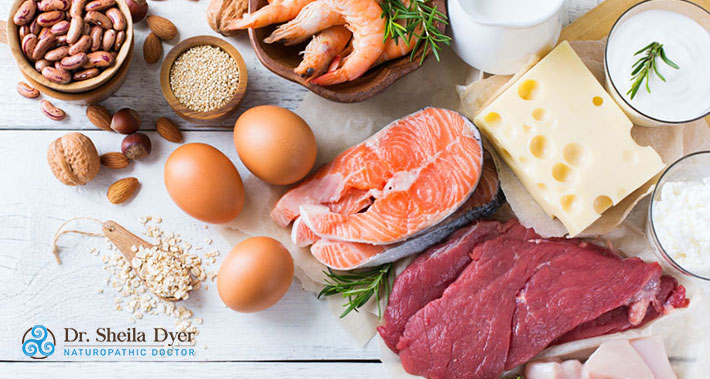We live in a fast-paced world, where being tired can get chalked up to too much work, not enough sleep, or burnout.
While those things can all be contributing factors, if you find yourself constantly exhausted, you may be struggling with chronic fatigue.
Chronic fatigue can be frustrating to deal with, and it can be especially hard to find help when it feels like you barely have the energy for your day to day life.
I’m Dr. Sheila Dyer, a naturopathic doctor in Toronto and I want to help you find solutions.
Chronic fatigue can be caused by a number of issues but the one we’re going to talk about in this article is anemia.
Anemia is a fairly common condition, affecting about 1.6 billion people worldwide, and in this article we’re going to take a look at what it is, what causes it, and what you can do if you think you may be experiencing symptoms.
What Is Anemia?
Anemia is a blood disorder defined by a lower than normal red blood cell count, measured using levels of hemoglobin in the blood.
Hemoglobin is the protein that red blood cells use to carry oxygen.
Since red blood cells distribute oxygen through the body, lower numbers of them can lead to issues when not enough oxygen is reaching organs and tissues that need it.
Anemia is more common in people who menstruate and people with autoimmune conditions or other chronic illnesses.
Symptoms Of Anemia
The best known symptom of anemia is chronic fatigue, which can manifest as tiredness or trouble focussing.
Anemia can also cause dizziness, constipation, shortness of breath, chest pains, brittle nails, and cravings for unusual non-food items, such as ice, clay, or dirt.
Any of these symptoms could be grounds for a blood test which can lead to an anemia diagnosis.
What Causes Anemia?
Anemia can be caused by a number of factors including:
- Hypothyroidism
- Low levels of the hormone erythropoietin, which triggers red blood cell production
- Inadequate intake of iron, vitamin B12, and/or folate.
It can also be caused by red blood cells being lost or destroyed faster than they are produced.
This can be caused by several illnesses and conditions including:
- Childbirth
- Sickle cell anemia
- Ruptured blood vessels
- Accident caused internal or external bleeding
- Heavy menstruation
- Genetic disorders
Naturopathic Solutions For Anemia
In most cases, anemia is caused by your body missing components that it needs to build red blood cells.
When this is the case, making dietary changes can address vitamin and mineral deficiencies that can cause anemia, as well as helping improve how well your body can process the iron that you do take in.
1. Identify And Address The Underlying Cause
If you’re concerned that you may have anemia, talking to a naturopathic doctor is a good first step.
Anemia can often be managed through diet if the issue is a lack of nutrients, but it can also be caused by more serious health conditions.
If there is an underlying cause that can be addressed, the anemia may go away without further intervention.
2. Seek Out Foods Rich In Iron
For those looking to get more iron in their diet, the good news is that there are lots of options.
Fish, shellfish, and red meats all have high levels of iron, especially beef or chicken liver, but there are also many iron rich foods for those who avoid meat.
Nuts and seeds such as cashews, pistachios, sunflower seeds, and pumpkin seeds are all rich in iron.
You may have heard that spinach is high in iron, which is true.
Leafy greens such as watercress, kale, collard greens, and broccoli are high in iron.
3. Avoid Foods That Impair Iron Absorption
Some foods contain compounds that interfere with iron absorption.
This can mean that even if you’re eating enough iron, your body can’t make the most of it.
Milk and other dairy products contain calcium, which can interfere with iron absorption, as can tannins found in grapes, corn and sorghum, and phytates found in whole grain wheat and rice products.
Black tea, coffee, gluten rich foods, peanuts, parsley, and chocolate can also interfere with iron absorption.
Having anemia doesn’t mean that these foods are entirely off limits, but it may mean that they should be eaten in moderation and not at the same time as iron rich foods.
4. Consider A B Complex Vitamin
Iron, folate, and vitamin B12 deficiencies can all be to blame for anemia, and B12 is easy to take as a supplement if your diet isn’t providing enough of it.
Vitamin B12 is one of eight B vitamins that makes up the b complex vitamins, and taking a B-complex vitamin will help boost vitamin B-12 levels while keeping an ideal balance of the other B vitamins.
Book An Appointment With Dr. Sheila Dyer, ND
The long term fatigue that anemia often causes can feel like it will never go away, especially if you’ve been struggling with it for a while, but there is help available.
Whether you have a diagnosis of anemia or you’ve started noticing symptoms and have concerns, booking an appointment with me, Dr. Sheila Dyer, ND, can help.
We can work together to adjust your diet to get the iron you need, avoid foods that may cause issue with iron absorption, address the underlying cause of your anemia, and get you back to feeling your best.
If you have questions about naturopathic medicine, or would like to start with your first consultation, contact me, and let’s book an appointment.
Dr. Sheila Dyer, ND1080 Dovercourt Rd,
Toronto, ON M6H 2X8
(416) 554-5135
► https://g.page/DrSheilaDyerNd
Dr. Sheila Dyer is a Naturopathic Doctor and a practicing registered nurse offering holistic healthcare with a scientific focus

